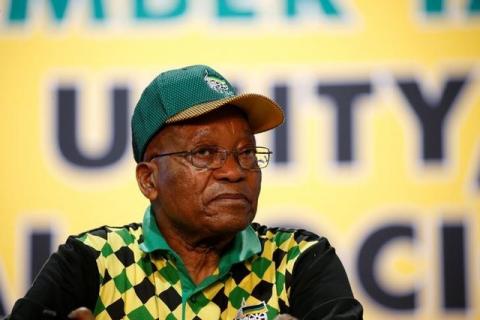Advertisement
South African enquiry can investigate Guptas in fresh blow to Zuma
JOHANNESBURG (Reuters) - South Africa's President Jacob Zuma said on Thursday a judicial enquiry could investigate allegations of influence peddling by his friends the Gupta brothers, in an apparent fresh sign of his waning power.
The announcement is a blow to Zuma because he went to court in an attempt to thwart the investigation.
The enquiry will look at whether the three brothers offered cabinet positions to former deputy finance minister Mcebisi Jonas and former lawmaker Vytjie Mentor, according to the government gazette.
It will also examine whether Zuma or any member of government facilitated the unlawful awarding of tender contracts that benefited the Guptas. Zuma and the Guptas deny wrongdoing and say they are victims of a witch hunt.
"I hereby appoint a Commission of Inquiry to investigate allegations of state capture, corruption and fraud in the public sector," said the order signed by Zuma.
Zuma became president in 2009 and is set to serve until his second term ends next year, but the ruling African National Congress says it is deciding whether to cut short his tenure in favour of its new leader Cyril Ramaphosa.
Ramaphosa, who is South Africa's deputy president, is in pole position to win next year's election. He has pledged to combat corruption and some party officials say he would boost the ANC's electoral chances were he to take the reins early.
Zuma was under pressure to release the terms of reference for the enquiry after the judge overseeing it said earlier this week he could not start without them.
Zuma's supporters said it should cover the undue influence all private business has over government, including firms owned by white South Africans who have dominated the economy for decades. His opponents wanted it to focus on the Guptas.
The opposition Democratic Alliance welcomed the terms released on Thursday.
"For too long, the Gupta family has had a stranglehold over the South African government, and particularly over President Zuma," senior DA official Glynnis Breytenbach said in a statement.
The allegations which will form the heart of the enquiry were investigated by South Africa's public protector, a constitutionally-mandated anti-graft body, in 2016.
The public protector recommended that Zuma set up an enquiry into her findings, but Zuma tried to block the enquiry until a high court last month ordered him to establish one.
The government gazette said the terms of reference for the enquiry could be added to or amended and that the enquiry should report to the president within 180 days of its start.
(Reporting by Alexander Winning; Editing by Matthew Mpoke Bigg)



















Add new comment